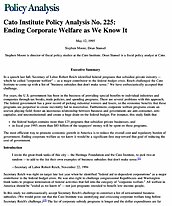In a speech last fall, Secretary of Labor Robert Reich identified federal programs that subsidize private industry — which he called “corporate welfare” — as a major contributor to the federal budget crisis. Reich challenged the Cato Institute to come up with a list of “business subsidies that don’t make sense.” We have enthusiastically accepted that challenge.
For years, the U.S. government has been in the business of providing special benefits to individual industries and companies through tax breaks, trade policies, and spending programs. There are several problems with this approach. The federal government has a poor record of picking industrial winners and losers, so the economic benefits that these programs are purported to create inevitably fail to materialize. Furthermore, corporate welfare programs create an uneven playing field; foster an incestuous relationship between business and government; are anti-consumer, anti-capitalist, and unconstitutional; and create a huge drain on the federal budget. For instance, this study finds that
- the federal budget contains more than 125 programs that subsidize private businesses, and
- in fiscal year 1995, more than $85 billion of the taxpayers’ money will be spent on these programs.
The most efficient way to promote economic growth in America is to reduce the overall cost and regulatory burden of government. Ending corporate welfare as we know it would be a significant first step toward that goal of reducing the cost of government.
About the Authors

This work is licensed under a Creative Commons Attribution-NonCommercial-ShareAlike 4.0 International License.
